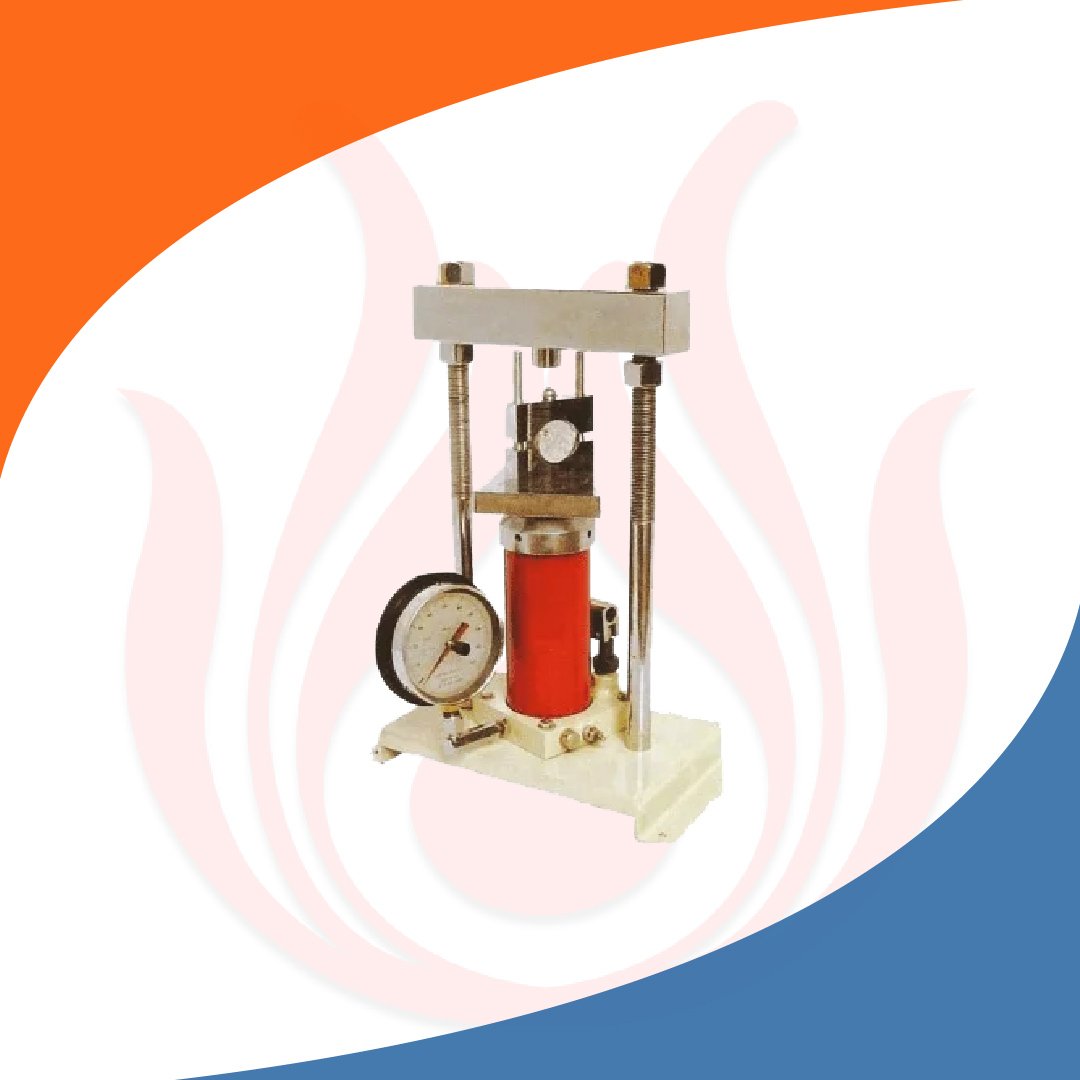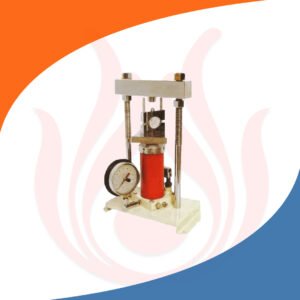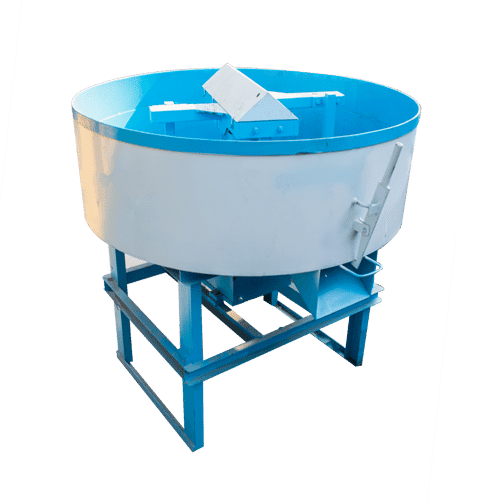Brazilian Test Apparatus
- High Quality Materials
- Compliance With Standards
- Clear Product Information
- Warranty & Support
- Product Testing & Certification
- Delivery & Policy
- Ask a Question
- Estimated Delivery: 5 Days – 10 Days
- DESCRIPTION
FEATURE | SPECIFICATION |
Pressure Gauge Capacity | 0-100 kn x 1 kn |
Plate Diameter | 50mm |
What is Brazilian test apparatus ?
The Brazilian test apparatus, also referred to as the ‘Brazilian Test’, is an application-specific tool in material science that performs tests on cylindrical specimens such as rocks and concrete for the determination of tensile strength and compressive strength. Its name comes from the methodology of testing, which compresses a flat sample in diametrical directions mimicking what may occur under normal operating conditions.
The test is performed by applying force perpendicularly across the sample until rupture takes place, supplying critical information concerning the material under compression. The Brazilian Test is extensively used in geotechnical and construction engineering mainly aimed at the determination of the quality/durability and structural integrity of materials needed for design, as well as for optimization purposes. Its importance is not limited to a number of different fields where the mechanical properties knowledge about cylindrical materials are very vital in order to allow safety and reliability for them on various applications.
Table of Contents
What Are the Key Features of Brazilian test apparatus ?
Brazilian Test Apparatus Purpose: It is meant for assessing the tensile strength and deformation properties of the cylindrical rock specimens.
Cylindrical Specimen: Uses a cylindrical sample, usually a rock core with specified dimensions and height.
Loading System: Uses a loading frame with either hydraulic or mechanical systems to impose axial loads on the specimen.
Confining Pressure Control: Includes mechanisms for control and also confining pressure, mirroring the subsurface environment.
Strain Measurement Devices: This includes devices that record axial and also radial strains during the test, giving strain deformation values.
Data Acquisition System: Uses a sophisticated data acquisition systems to capture and analyse the real-time test result measurements.
Safety Features: Utilizes safety devices that prevent the loss of specimen from maceration, thus assuring a regulated and precise testing.
Versatility: Flexible in terms of the rock types and also sizes, making it possible to use a variety of geological materials for the tests.
Compliance with Standards: Based on the international standard, thus guaranteeing accuracy and the comparability of results.
Research and Industry Application: Commonly applied in the geotechnical and also geological studies, as well as for evaluating oil and gas operations rock properties.
How Does the Brazilian test apparatus Work?
One of the widely used test equipment in Brazil for assessing tensile strength from rocks and the concrete is cylindrical samples placed between two flat platens. Diametrical compression of the specimen is produced by applying axial load over one platen. This stress leads to tensional failure across the diameter, which also enables determining the tensile strength. Strain gauges or extensometers measure the deformation.
The test terminates with the cracking of a specimen. This approach is very critical for evaluating the material strength and also structural security in geotechnical engineering or in construction systems. First, the Brazilian test provides very important information on how rocks and concrete behave under tensile loading so it is also essential to the structural integrity in any form of civil engineering projects.
What are the Application of Brazilian test apparatus ?
The primary use of the Brazilian Test Apparatus is in geotechnical engineering for the determination of rock and concrete tensile strength. This technique includes compressing a cylindrical sample until the failure takes place. The main application is related to the assessment of indirect material tensile strength and also fracture toughness. The Brazilian test is used in geology and also civil engineering to assess the structural integrity of rock formations, allowing one to understand its capacity. In the construction industry, engineers also use this device to determine the tensile strength of concrete which is an very important factor that can signal durability in infrastructure.
In addition, the Brazilian test is a very good research and material science resource used to classify materials behaviour under the particular loadings. It is also applicable in the experimental mechanics and structural analysis, which adds to knowing the material’s properties. In summary, the Brazilian Test Apparatus contributes significantly in many fields since it measures accurately tensile strength of critical materials needed for constructing strong structures and ensuring security durability or different engineering projects.
The Brazilian test apparatus, also referred to as the ‘Brazilian Test’, is an application-specific tool in material science that performs tests on cylindrical specimens such as rocks and concrete for the determination of tensile strength and compressive strength. Its name comes from the methodology of testing, which compresses a flat sample in diametrical directions mimicking what may occur under normal operating conditions.
The test is performed by applying force perpendicularly across the sample until rupture takes place, supplying critical information concerning the material under compression. The Brazilian Test is extensively used in geotechnical and construction engineering mainly aimed at the determination of the quality/durability and structural integrity of materials needed for design, as well as for optimization purposes. Its importance is not limited to a number of different fields where the mechanical properties knowledge about cylindrical materials are very vital in order to allow safety and reliability for them on various applications.
What are the Advantages of Brazilian test apparatus ?
It has a number of advantages as far as the Brazilian test apparatus is concerned. First, this equipment can be used to analyse the tensile strength in rocks and concrete materials. The first advantage of this method is that it allows to simulate in situ conditions since the behaviour generated by a uniaxial compressive stress, which corresponds with these materials. It is specifically very valuable for the analysis of anisotropy in rock formations where one can understand in what way they may have responded under normal pressure.
The test can be used in many different situations, including research and also engineering applications because of its low complexity and relative affordability. In addition, the research findings from the Brazilian tests provide a lot of fundamental data for structure design, material improvement optimization and also geological interpretation. Thus, the Brazilian test apparatus is a very effective tool in determining the tensile strength of rocks and also concrete for civil engineering-based applications as well as geotechnical investigations all over.
Why Buy From Lotus Traders?
The Brazilian test apparatus is also a very vital instrument for assessing the different materials and components, helping in quality assurance as well as the safety standards. It allows the testing under harsh conditions in order to assess the structural integrity, thermal resistance and many other important factors necessary for many industries. Its flexibility and accuracy make it very priceless in the research and development sector, guaranteeing the high quality of product in Brazilian market.
Nevertheless, the continuous improvement in the technology and integration of the global standards are very necessary to strengthen its effectiveness even more. In summary, the Brazilian test device serves as a pillar in promoting innovation, product quality and also industrial compliance; regular upgrades and international alignment will ensure that it remains central to the world of materials testing
Frequently Asked Questions
The Brazilian test machine or the Brazilian Splitting Test determines the tensile strength for rocks and concrete.
Cylindrical specimens are subjected to the compressive loads until they fail in order to approximate the stress conditions. The tensile strength of the specimen is calculated by what it takes to break them.
It is used to evaluate the strength and structural design of construction materials, which assists in placing or assessing a bridge road.
Commonly applied in the geotechnical engineering, civil engineering and also construction fields for the assessment of material suitability to construct buildings or infrastructure.
In the testing apparatus, a cylindrical specimen is placed and pressure is applied until it fractures. The obtained data provides the engineers with material strength information.
It may not fully reflect the field conditions, and the findings are affected by various aspects such as specimen preparation and also surface features.
Yes, there are many different standards like ASTM and ISRM which give the guidelines for the test to be carried out with a lot of consistency and accuracy.
Engineers often combine it with other tests like the uniaxial compressive strength test for a comprehensive material assessment.











